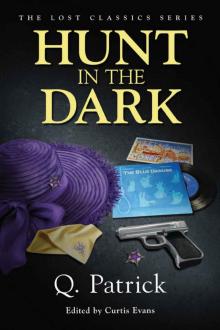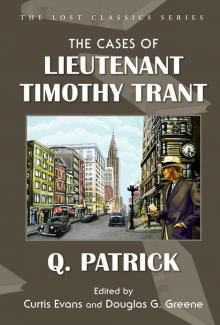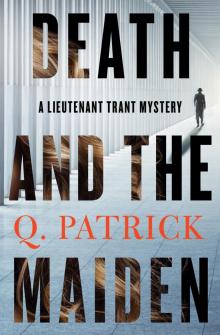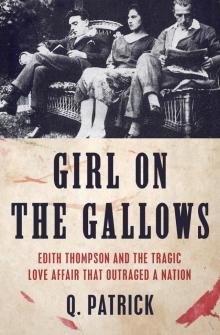- Home
- Q. Patrick
Death and the Maiden
Death and the Maiden Read online
DEATH AND THE MAIDEN
A Lieutenant Trant Mystery
Q. Patrick
I
The last of those mysterious letters for Grace Hough arrived at dusk. I saw the messenger boy crossing the campus just as I was going over to the dormitory to dress for Steve Carteris’ twenty-first birthday party in New York.
The evening was windless, breathless. Although May was only a few days old, the air was warm as June and heavy with the scent of lilac. Around me in the half darkness other students, boys and girls, made indeterminate shadows as they smoked and laughed. Wentworth College, withdrawn in its coeducational seclusion, was coming to the uneventful end of an uneventful day.
The messenger boy and I arrived simultaneously outside Pigot Hall.
“Special delivery for Miss Grace Hough,” he said, holding out the letter.
“I’ll take it for her.” I scribbled Lee Lovering for G. H. on the grubby receipt and started up the stairs to the top floor room which Grace Hough and I had shared for almost four years.
It seems incredible now that I could have taken that fateful letter so casually. But special deliveries had been coming thick as flies for my roommate during the past few weeks and, while still a subject of curiosity to some, they had lost their novelty for me.
Grace was peering in the mirror when I entered with the letter. She had, surprisingly, been invited to Steve Carteris’ party, and was already dressed in her rose satin which was somehow too pink and too pretty for her thin, delicate face.
“Somebody must love you, Grace,” I said. “Another special.”
Her pale blue eyes were bright with excitement as she snatched the letter from me. After one swift, short-sighted look at the envelope, she disappeared with it into the bathroom.
Grace could be infuriating at times, and never more so than in the throes of some real or imaginary affair. I had been patient with her while she teetered, rather coyly, on the brink of a romance with Steve Carteris. For Steve was a perfect dear and it was fun having him around. But it wasn’t so much fun, after Steve was through, to have to listen to Grace raving about Robert Hudnutt, our handsome French prof. I stood for that, too, at first. But when Hudnutt married the abrupt, unromantic Dean of Women, and Grace continued to yearn after him like a Victorian heroine, I lost my temper with her completely, told her she was making a fool of herself and she had better snap out of it.
Presumably she had snapped out of it. But she hadn’t forgiven me for my criticism. And so, when this hectic correspondence started, she went secretive on me, making a point of never confiding in me at all.
That’s why I knew nothing about the writer of those special delivery letters. That’s why I never bothered my head about them—never dreamed how the cramped, spidery handwriting on those innumerable envelopes was slowly and remorselessly spelling out the handwriting on the wall for Grace Hough.
I have often blamed myself bitterly for my blindness—for my failure to make allowances for Grace. She’d had so much disappointment and tragedy during the past year. Her father’s suicide and the collapse of the Hough fortune had swept the ground from under her feet. Besides, she was Jerry Hough’s sister, and my own stubborn infatuation for Jerry should have made me more sympathetic.
But it didn’t. And not until it was too late did I realize how very far a little sympathetic understanding might have gone in preventing suffering and heartbreak.
That night, however, I was too rushed to dwell on anybody’s emotional problems. The sound of arguing voices in the next room warned me that Norma and Elaine Sayler were already in the last stages of dressing. Norma was driving us to New York in their car, and since she disliked me even more than I disliked her, she would have loved an excuse to start without me.
I grabbed my last year’s green velvet and went in for a bit of quick changing. The prospect of an evening at Manhattan’s swank Amber Club would always have been exciting. It was doubly so that evening since it involved a flagrant breach of Wentworth’s most resented regulation. Ever since Penelope Hudnutt’s recent importation from Oxford as our progressive Dean of Women, she had forbidden all girl students to visit New York unless their objective was one hundred per cent cultural. It was amazing how many cultural objectives had been unearthed since the rule went into effect. This time Grace, the Saylers and I had managed to skirt around it by asking permission to see the celebrated French actress, Roulane, in a current Broadway revival of Pbèdre. Since Racine was Required Reading in her husband’s French Literature Course, Penelope had been obliged to give her consent. She had been shrewd enough, however, to insist on buying our tickets for us, thus setting us back $2.28 apiece.
I was dabbing some of my precious Nuìt D’Exase behind my left ear when Elaine, the nicer and less glamorous of the two Sayler girls, burst into the room, trailing clouds of amber chiffon.
“Norma says she’s leaving in five minutes. My dear, you must see her. That new outfit is straight out of a clip joint.”
Elaine swooped to the mirror and patted at her tightly frizzed bang. “Damn this thing, it was meant to give a Hepburn touch but it’s come out all Harpo Marx. Where’s Grace? Still wallowing in the tub?”
“Wallowing in romance,” I corrected. “Another special delivery.”
“Another!” Elaine shot round, her harlequin eyebrows zig-zagging upward. “Who on earth can be feeling so voluminous about Grace?”
“Presumably someone who’s even more short-sighted than she is,” drawled a voice from the door.
As usual, Norma Sayler had made a feline entrance. She stood posed on the threshold, her disgustingly perfect figure sheathed in flame taffeta. One shoulder was sprayed with a huge corsage of white orchids, her amazingly blonde head was tilted slightly backward.
She moved languidly to the mirror, brushing Elaine aside. “Oh, Lee darling, I stopped in at the infirmary to see Jerry Hough this afternoon. His ankle is nearly all right again and everyone’s pestering him now the place isn’t quarantined any more. But he said he’d quite like to see you if you dropped around some time with Grace. Why don’t you do that?”
In the mirror I could see she was watching me as she always did when she mentioned Grace’s brother Jerry.
“They’ve only put the infirmary out of quarantine today,” I said. “You didn’t waste much time getting round there.”
“Why should I, my dear? I had to thank Jerry for these orchids.” One of Norma’s scarlet-nailed fingers touched their waxy petals. “He wanted me to take his fraternity pin, too. But I said it just wouldn’t be strong enough for such a lovely corsage. By the way, do you have an old brooch or something you could lend me?”
“Why not use some of the other fraternity pins you’ve been saving for a rainy day?” I asked in my sweetest voice.
Norma knew how I felt about Jerry, and she loved to remind me that she was going all out to annex his scalp. Secretly I had doubts about her success. Not that I could have stopped her myself, for to Jerry I was just a kid from his home town—the girl with whom he had grown up. But Jerry was one of those rare phenomena, an ace athlete with brains. He might let Norma cadge orchids off him; he might give her a rush for a while, but, sooner or later, I was confident, his good sense would do what I couldn’t do. And Norma would be out on her ear.
Forgetting her request for an old brooch, Norma drawled on: “Poor Jerry, he really seemed disappointed that I wouldn’t take his fraternity pin. But you know what that means and I couldn’t dream of tying myself down. After all, he’s a dear but he hasn’t a cent and think of having the god-awful Grace in the…”
At least she had the decency to break off when the bathroom door swung open and Grace appeared. My roommate stood perfectly still on the threshold, the s
pecial delivery in one hand.
With her talent for humiliating people less attractive than herself, Norma had made the supersensitive Grace loathe her with a hatred that was almost psychopathic.
My roommate’s pale eyes fixed Norma with a steadiness that was somehow frightening. She said: “There’s very little chance of your having the god-awful Grace in the family. I’d rather be dead myself—yes and see Jerry dead, too.”
Norma seemed staggered into speechlessness by the quiet fury of this unexpected attack. Even I was a little taken aback.
We stood gawking for a few seconds. Then Elaine said hastily: “No bickering, children. Let’s get going or the boys will have drunk the Amber Club out of champagne.”
But Grace made no move to leave. “I’m not going to the Amber Club.” She turned to me, adding in a voice that trembled slightly: “Will you please explain to Steve, Lee—that is, if he notices I’m not there? I’ve just heard that a friend of mine’s going to be in New York tonight. Naturally we want to be alone.”
“You mean your special deliverer?” asked Elaine eagerly.
Grace didn’t seem to hear. “I thought he and I might go to Phèdre, together, Lee. So if you’re not using your ticket, perhaps you’d let me have it.”
I felt as surprised as Norma and Elaine looked but I said: “Of course,” and brought her the ticket from the dressing table.
“Thanks,” Grace turned to Elaine. “It wouldn’t be taking you out of your way, will it? The Cambridge Theater’s just across the street from the Amber Club.”
It was while she was stuffing the ticket into her pocketbook that I noticed the first of those many extraordinary things which I was to remember afterwards when each thing that Grace did or said that night assumed such terrifying importance.
My roommate had always been absurdly puritanical about makeup. And yet, since reading that letter, she had been experimenting with my cosmetics in the bathroom. There was a heavy daub of lipstick on her mouth and the hectic flush in her cheeks was due partly to a clumsy application of rouge.
Still clutching the letter, she crossed to the mirror and rather unsteadily pinned onto her dress the small diamond brooch which was the one piece of jewelry to survive her father’s bankruptcy. Then she went to the closet and pulled out her only evening wrap, a miserable blue affair with a wilted rabbit collar.
I don’t know why, but suddenly I was struck with the pathos of the situation—Grace, whose past romances had never got to first base, going off to the theater to meet a real live admirer with too much make-up on her face and that hideous old wrap. I yielded to an impulse of generosity.
“If you’ve got an important date, Grace, why don’t you borrow my fur coat? I’m not going to use it.”
She turned hesitantly. Ever since their prospect of great wealth had been tragically swept away, both Jerry and Grace had been absurdly diffident about accepting favors. “You really mean that?”
“Of course.”
While Norma watched in sardonic silence, Grace slipped into my sleek galyak coat and pushed the special delivery letter into one of the deep pockets. For a moment she rubbed her cheek a little wistfully against the creamy fur of the collar.
“Thanks, Lee,” she said. “Thanks so much. I promise to take terribly good care of it.”
I often wonder now how I would have felt at that moment if I’d had the slightest inkling of the fantastic and horrible things which were going to happen before I saw my galyak fur coat again.
II
We didn’t do much talking on the thirty mile drive to New York. The bitter little scene between Grace and Norma had left us all uncomfortably thoughtful. When we reached the Cambridge Theater where Phèdre was playing, Grace got out without saying a word and hurried straight into the theater. Elaine and I followed her into the foyer, to keep a weather eye open for faculty members, while Norma parked the car outside the Amber Club, just across the street.
“I’d give my back teeth for a look at Grace’s letter-writing lover,” remarked Elaine. “Do you think there’s a chance of seeing him?”
“Not if Grace has anything to do with it,” I began.
But Elaine clutched my arm and stared goggle eyed over my shoulder. “My dear, we’re sunk,” she breathed. “Penelope and Hudnutt. And, heavens above, Marcia Parrish and the Big Appel, too. The entire faculty’s descending upon us.”
I turned just in time to see the Dean of Women and her husband threading through the thin stream of late arrivals. Behind them were Harold Appel, our bachelor Dean of Men, and Marcia Parrish, the youngest and most popular member of the Wentworth faculty.
Retreat was impossible except into the theater itsçjf, and I had given Grace my ticket. There was nothing for it but to hold our ground and pretend we really were attending the show. The four of them bore down upon us, headed by Penelope Hudnutt.
“Well, girls, you’ve got here safely, I see,” she said in that clipped, English voice of hers. “Where are Norma and Grace?”
Very sheepishly I told her we were waiting for our little friends. She gave a brief nod and passed on into the house, followed by Dr. Hudnutt who smiled one of his vague smiles as if he knew he ought to know us but hadn’t the slightest idea who we were. The Big Appel, whose father was lawyer to the Houghs and my own family in Newhampton, offered some inanity about the home town being well represented.
As soon as the faculty quartet had disappeared into the auditorium, Elaine and I stared at each other. “You’re right,” I said. “We are sunk. They’ll be on the lookout for us in the intermissions now.”
“I’ve got an idea.” Elaine’s face cleared and she dashed over to the box-office where I saw her frizzed bang bobbing vigorously at the man behind the grille.
While she was gone Grace appeared again and announced rather breathlessly that all arrangements had been made, her friend was to join her shortly at the theater.
Then Elaine darted over from the box-office, exclaiming jubilantly, “The man in the cage is a perfect lamb. He’s given me the exact time for each curtain. All we have to do is to sneak over from the Amber Club for the intermissions and mingle nonchalantly with the crowd. The Hudnutts won’t smell thé rat because they are in the balcony.”
“The Hudnutts!” Grace, who had paid no attention to Elaine until then, swung round on her suddenly, her brightly rouged mouth half open. “You mean, Penelope Hudnutt is here—at the theater? I knew of course that he …”
She broke oíf quickly, an odd look coming into her eyes. Then, mumbling something about not waiting outside for her friend, she disappeared into the now darkened theater.
Elaine glanced after her and tapped her forehead. “Nuts,” she said. “Completely nuts. Come on, my dear, let’s go and whoop it.”
Looking, probably, as guilty as I felt, I followed her out of the foyer and hurried across the street toward the gay red and white awning of the Amber Club.
A waiter conducted us to a large, flower-decked table on the brink of the dance floor. Steve Carteris was one of those people who always got the most coveted table and the smoothest service without any apparent effort. And that night he had outdone himself. Bottles of champagne, undoubtedly of the most approved vintage, nestled in beaten silver ice-bowls. An exotic variety of chef’s specials from the buffet froid made well-groomed patterns around the central birthday cake with its twenty-one candles.
And when Steve himself rose to welcome us, groomed to the last hair’s breadth in a midnight blue tuxedo, it seemed incredible that he was just another Wentworth Senior like the rest of us. But then Steve, with his lithe athlete’s figure and his Carteris profile, had a genius for being the right thing at the right time. That was part of his birthright, as the scion of one of the South’s oldest families and the son of Governor Carteris who was said to be headed for the White House.
“I’ve been reserving the place of honor for you, Lee,” he said in his slightly Southern drawl.
As he pullçd out the chair on his ri
ght, I glanced a trifle maliciously at Norma. She appeared quite contented, however, with her place between the captain of the Wentworth football team and the President of the Dramatic Society.
While waiters scurried around, filling our plates and glasses, I explained Grace’s absence to Steve.
“Too bad,” he said lightly. “I was hoping for a sort of reconciliation with the Hough family tonight. But with poor old Jerry’s busted ankle …” he broke off, his dark eyes losing for a moment their half derisive, half indolent smile. “Grace didn’t dig up that theater date as an excuse not to come here, did she?”
“Good heavens, no,” I said, and told him all the details of the special delivery letter and my roommate’s last minute change in plans. I also told him that we would have to put in an appearance at the Cambridge Theater during the intervals.
For a while he had to attend to his duties as host, but he returned to the subject again as we left the table to dance.
“I had a hunch Grace wouldn’t come,” he said, as he took my hand and guided me smoothly over the floor. “She thinks I’m a low-living son-of-a-gun.” Somehow his voice sounded less nonchalant than usual. “She—well, I’ve often wondered if she told you the reason why the Houghs and I severed diplomatic relations.”
I knew, of course, that Grace’s friendship with Steve had somehow gone sour. I also knew that a short time ago Steve and Jerry, who had been inseparable, had stopped rooming together. But no one had told me what it was all about.
“Grace disapproves of me, you know,” Steve was beginning.
But I broke in, “Steve, darling, of course she disapproves of you. So do I. You’re the most disreputable person on the campus. But we all adore you.”
“Don’t say that if you don’t mean it, Lee.”
He squeezed my hand, and I at least abandoned myself completely to the rhythm of the dance. Steve always made me feel gay and happy. If I hadn’t been so stubbornly in love with Jerry Hough, I’d have jostled my way shamelessly through the crowds of his female admirers and tried for Steve in a big way. As the orchestra stopped, I slipped into his hand the tiny enameled lighter I had bought for his birthday. He seemed delighted with it.

 Death Goes to School
Death Goes to School Hunt in the Dark
Hunt in the Dark The Cases of Lieutenant Timothy Trant (Lost Classics)
The Cases of Lieutenant Timothy Trant (Lost Classics) Death for Dear Clara
Death for Dear Clara S.S. Murder
S.S. Murder Death and the Maiden
Death and the Maiden The Grindle Nightmare
The Grindle Nightmare Cottage Sinister
Cottage Sinister The Girl on the Gallows
The Girl on the Gallows